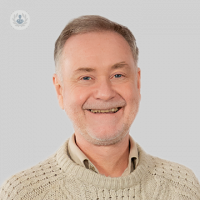A pain in the back: what is ankylosing spondylitis?
Written in association with:Back pain is a common problem that many of us will experience in our lives. It can have a variety of causes, from a slipped disc to muscle strain. Ankylosing spondylitis is a chronic (long-term) condition that can cause pain and inflammation and eventually leads to the bones in the spine fusing together. Renowned rheumatologist Professor Robert Moots explains this condition:

What is ankylosing spondylitis and what are the symptoms?
Ankylosing spondylitis (AS) is an inflammatory condition of the back that, if left untreated, can lead to irreversible stiffness, pain, and bending of the back. It is more common in men than in women, typically starts in young people in their 20s and comes on slowly in contrast to other back problems, such as slipped discs, which start very acutely. The main symptoms are stiffness in the back first thing in the morning, which slowly wears off during the day.
How is ankylosing spondylitis diagnosed?
Ankylosing spondylitis is diagnosed by X-rays or MRI scans. MRI scans are the most sensitive test and can pick up signs of AS sooner, as they shows inflammation in the lower back. X-rays, on the other hand, only show later signs of abnormality, unfortunately after damage has occurred.
A blood test for the gene HLA-B27 can help, as is is much more prevalent in individuals with AS. However, this is not sufficient to make a diagnosis.
Is there a cure for ankylosing spondylitis?
At this present time, ankylosing spondylitis can’t be cured; however, it can be controlled extremely well with medication.
How is ankylosing spondylitis treated?
Ankylosing spondylitis treatment is designed to suppress the inflammation that characterises the disease. In some people, treatment with drugs similar to aspirin, such as naproxen or etoricoxib, is all that is needed. However, when these are not effective, the next line of “designer” biologic drugs are used, usually with an excellent response.
What should you be aware of if you have a family history of ankylosing spondylitis?
While the causes of ankylosing spondylitis are poorly understood, it often runs in families. If someone in your family has this condition, you have a much greater risk of developing it. If that’s the case, you should watch out for symptoms of low back pain and stiffness. If you notice this, then you should get a check-up from your GP.


